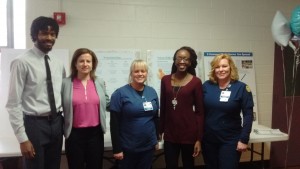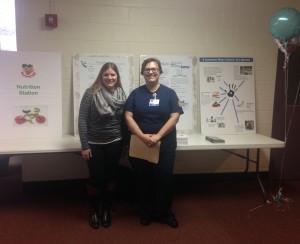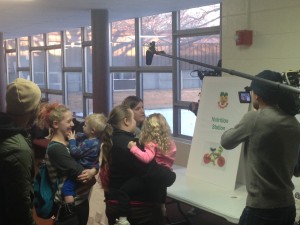The Department of Public Health and Health Sciences has been busy at work helping volunteer with the community during the Flint water crisis, offering assistance with lead screening and blood testing at various sites throughout the city. The PHHS efforts were done in collaboration with UM-Flint Student Care Coordinator and Clinical Nursing Faculty member Veronica Robinson, MSN, RN, and students from the Department of Nursing. In addition to having many student volunteers, faculty and staff from PHHS have volunteered as well, including Dr. Gergana Kodjebacheva, Dr. Shan Parker and Brenda Cameron. Hosting services at Cathedral of Faith Ministries and the downtown Flint YMCA in Flint, dozens of adults and children have had the opportunity for education about lead absorption, and lead screening itself.
One of the many PHHS student volunteers, Jonathon Mateen II, was able to give us a first hand account of his experiences.
“My first date volunteering was February 17th, 2016 at Cathedral of Faith Ministries. This location was once an elementary school and has been converted into a church. This lead screening site was done together with Molina Health Care, The University of Michigan-Flint School of Nursing, and the Genesee County Health Department. It was set up event style with Molina providing tables for information, activities for children, a raffle with prizes and free food. Students from The School of Nursing along with public health students ran a hand washing station and a station on nutrition.
I started working the table on nutrition which discussed how a healthy diet can fight lead poisoning. I held two discussions with parents of children who were being tested for lead. Upon sharing with one parent that children absorb up to 50% of lead ingested while adults only absorb up to 10%, she excitedly searched for a piece of paper to write that information down. This stood out to me because of the amount of information concerning lead poisoning that was out there, showing me that not only is there a lot of information out there, but that everyone knows something different. The significance of health education is very important, as many people do not know a lot of the information surrounding this crisis and other public health problems despite the availability of the information.
From this task, I started to assist with hand washing. It was very important that children properly washed their hands. We served to make sure the children did not contaminate their hands with germs before being tested for lead. This involved us turning on the faucet, placing soap in their hands, singing the happy birthday song twice while washing, turning the faucet off, dispensing paper towel, and then opening the door. It was a duty making sure these energetic children kept their hands off of everything on the way to the testing room. Sometimes parents would come in the bathroom to see that their child was properly sanitized. This step also served the purpose of educating on the various ways lead enters the body. Lead can be found on many things children are interested in exploring, from toys to the outdoors. Hand washing is essential to fighting lead poisoning.
By volunteering I was able to participate in a community effort to promote education and awareness to the people of Flint. This was very important for me after the water crisis developed into what it is today. There is only so much that we have control of on a right now basis. Seeing different facets of health care and members of the community come together for this event was inspiring. While we were there to assist and educate, no amount of knowledge that can be disseminated to people compares to a lived experience. These events serve as a way to bridge the gap between that lived experienced and what we all need to know for the improvement of our health.”

Public Health and Health Sciences undergraduate students Jonathon Mateen (at left) and Ashley McCloud (second from right) with Dr. Gergana Kodjebacheva (second from left)
PHHS’s own Brenda Cameron also spoke on her experiences, which she found both rewarding and eye opening.
“I signed up to volunteer as I feel helpless during this crisis. Volunteers were plentiful so I wasn’t especially busy but that allowed me to interact with families attending the clinic and hear some of their personal stories and battles. Being there first hand brought the crisis to life; the real people affected, each still wondering what the future holds for their children and their homes. The organizations that coordinated the event did an outstanding job providing healthy and fun activities for the children to keep the experience positive and engaging. Giving my time showed me the time these families must sacrifice to get the information, water, and testing that they need. The experience was heartwarming as I saw the community pull together and all of the people lining up to help. It also opened my eyes to some of the many things we take for granted every day.”
Many of the PHHS student volunteers are also members of the Health Education Honor Society, Eta Sigma Gamma, and their participation was chaired by Department Associate Director Dr. Shan Parker. Eta Sigma Gamma President Shelby Miller also spoke of her experiences.
“I volunteered on February 17th at Cathedral of Faith and on February 23rd at Mount Olive Baptist Church. At each event we rotated volunteer duties, so I provided nutrition education aimed at helping to reduce the negative effects of lead, greeted participants at the door, and helped the children wash their hands prior to lead testing. The main thing that I got out of this experience was confirmation that I want to pursue a career in Public Health. This issue is happening so close to home and it just shows that public health professionals are so necessary to help deal with these kinds of social issues impacting the health of communities. It is also important for us, as public health professionals to advocate for these communities because they may not have the resources to advocate for themselves. It is very sad to witness the children of Flint having to go through this. After talking with the families it was evident that many of the children realize the harsh reality of what is going on in their community.”

We are so proud of all of our student, faculty and staff volunteers at Public Health and Health Sciences, and of all of our colleagues at the University of Michigan-Flint, and we look forward to continuing our leadership efforts throughout the community as we work towards helping in any way that we can with the Flint water crisis.
For more information the involvement of PHHS with the water crisis, including information on the remaining dates tot eh Flint Water Crisis Course, please visit Flint Water Crisis page.
